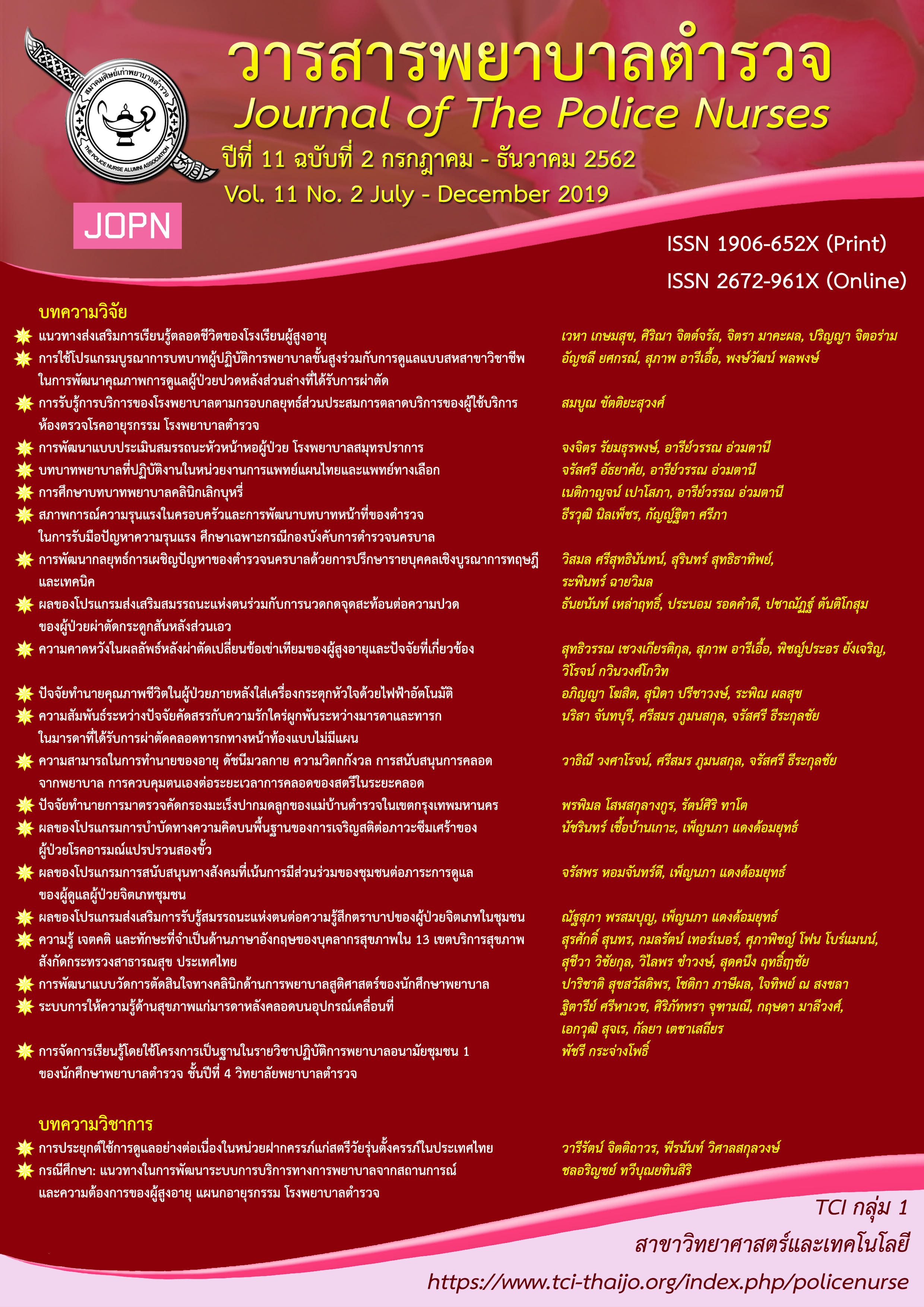THE DEVELOPMENT COPING STRATEGIES OF THE METROPOLITAN POLICE THROUGH ASSIMILATIVE INTEGRATIVE INDIVIDUAL COUNSELLING
Keywords:
assimilative integrative counseling, coping strategies, metropolitan policeAbstract
The purposes of this research were 1) to analyze the factors of coping strategies testing of the metropolitan police, 2) to develop individual counseling by assimilative integrating theory, and 3) to compare the effect of individual counseling on coping strategies of the metropolitan police. This research was divided into two phases. Phase 1 was developed the coping strategies testing of the metropolitan police by factor analysis. The samples were 720 policemen which were selected by random sampling from metropolitan police headquarters. Phase 2 was studying the effect of individual counseling by assimilative integrating theory. Police officers were randomly assigned from one commander to one control group and one police officer from one commander to a trial group of 15 persons, totaling 30 persons, participated in an integrated personal counseling program. Data were analyzed by repeated measures ANOVA of one factor between the groups and one factor within the group, paired-different test by Newman-Keuls procedure.
Research findings were as followed: 1) The coping strategies comprised of 8 factors, including problem solving, cognitive restructuring, social support, express emotions, problem avoidance, wishful thinking, social withdrawal and self-criticism - model fit ( χ2 (649) = 669.54, p = .07, GFI = .99, AGFI = .98). Problem solving had the highest standard factor loading. 2) The statistical significance at the .05 level was found on the metropolitan police who attended the individual programming counseling. They had higher coping strategies scores at the posttest and the follow-up phase than at the pretest phase. There was an interaction effect between experiment method and the duration of time at the .05 level of significance.
Downloads
References
Beck, A. T. (1985). Cognitive therapy. In H. I. Kaplan, & B. J. Sadock (Eds.), Comprehensive textbook of psychiatry/IV: Vol. 2 (pp. 1432-1438). New York, NY: Williams and Wilkins.
Britton, W. B., Lepp, N. E., Niles, H. F., Rocha, T., Fisher, N., & Gold, J. (2011). A randomized controlled pilot trial of classroom-based mindfulness meditation compared to an active control condition in 6th grade children. Journal of School Psychology, 52(3), 263-278.
Consoli, A. J., & Jester, C. M. (2005). A model for teaching psychotherapy theory through an integrative structure. Journal of Psychotherapy Integration, 15(4), 358-373.
Corey, G. (2004). Theory and practice of counseling & psychotherapy. USA: Thomson Brooks.
Craigie, M. A., & Nathan, P. (2009). A nonrandomized effectiveness comparison of broad-spectrum group CBT to individual CBT for depressed outpatients in a community mental health setting. Behavior therapy, 40(3), 302-314.
Hair Jr., J. F., Black, W. C., Babin, B. J., & Anderson, R. E.2014.Multivariate data analysis: A global perspective (7th ed.). Upper Saddle River: Prentice-Hall.
Joreskog, K. G., & Sorbom, D. (1996). LISREL8: User’s reference guide. Chicago: Scientific Software International.
Junpinit, V. (2008). Effect of a Mood Management Program incorporating guardians' participation on the reduction of anger and aggression among early teenager students (Master of family health). Faculty of Graduate Studies, Mahidol University.
Kochakul, A. (2007). Developing coping skills training program for reducing stress of police cadets (Doctor of Counseling Psychology). Faculty of Graduate Studies, Ramkhamhaeng University.
Kulasri, N. (2011). Individual counseling for developing students' self-confidence based on Roger's theory (Master of educational psychology and counseling). Faculty of Graduate Studies, Khon Khan University.
Liu, J., Nie, J., & Wang, Y. W. (2017). Effects of group counseling programs, cognitive behavioral therapy, and sports intervention on internet addiction in east Asia: A systematic review and meta-analysis. International Journal of Environmental Research and Public Health, 14(1470), 1-17.
Outaitaveep, N. (2017). Effects of rogerian individual counseling approach on university students' empathy (Master of Counseling Psychology). Faculty of Graduate Studies. Chiangmai University.
Patterson, G. T. (2016). A brief exploratory report of coping strategies among police recruits during academy training. Psychology Report, 119(2), 557-567.
Rogers, C. R. (1942). Counseling and psychotherapy: Newer concepts in practice. Boston, MA: Houghton Mifflin.
Royal Thai Headquarters. (2016). Annual report 2017. Bangkok: Royal Thai Headquarters.
Shimazu, A., & Schaufeli, W. B. (2007). Does distraction facilitate problem-focused coping with job stress? A 1 year longitudinal study. Journal of Behavioral Medicine, 30(5), 423-434.
Tobin, D. (2001). User manual for the coping strategies inventory. USA: Philadelphia.
Downloads
Published
How to Cite
Issue
Section
License
ผลงานที่ได้ตีพิมพ์แล้วจะเป็นลิขสิทธิ์ของวารสารพยาบาลตำรวจ















